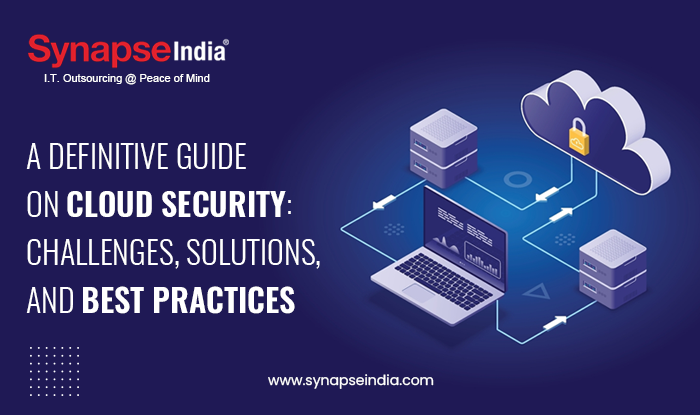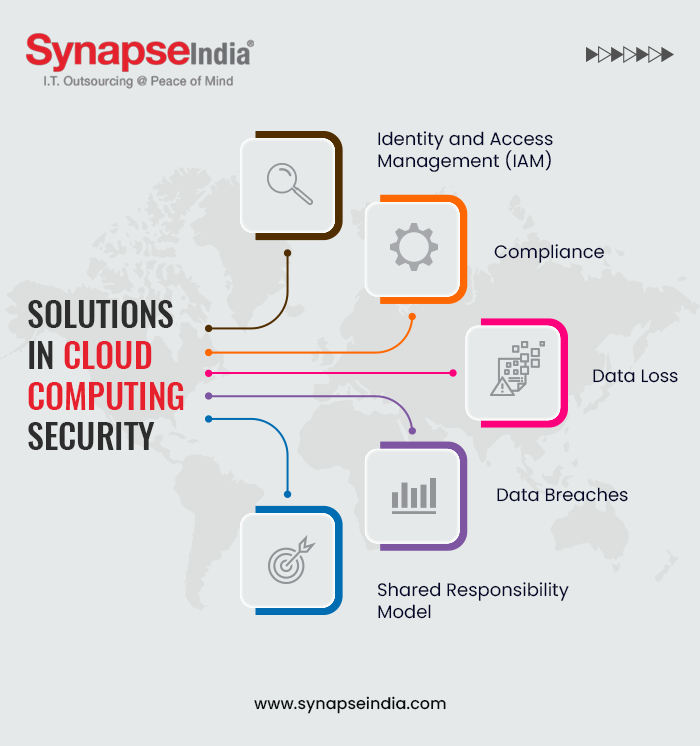 22 Nov 2023
22 Nov 2023
In recent years cloud services have come a long way. Cloud solutions and their services come at the forefront of the digital world. Regardless of any business, companies who have adopted cloud services excel their business in the digital world. Undoubtedly, cloud services propel the digital landscape. Access to cloud computing security has helped many businesses to transform their operations. Around 94% of businesses are using cloud services and excelling in their field. Unlike, it offers many advantages, but there are disadvantages too of cloud. The top one is security, and as an organization, it's important to analyze it before any breaches.
To avoid security breaches, this guide helps you know some of the challenges, solutions, and best practices, that can be implemented into your business. These practices help you to explore more on the cloud and enhance cloud security for your business.
Cloud security often called “Cloud Computing Security” comprises a number of commands, rules, technologies, and processes. All of these safeguard the infrastructure, data, and systems housed on the cloud. Cloud security solutions set authentic guidelines for certain users and these guidelines safeguard data, support regulations, and protect the privacy of the customers. It can also be tailored as per the requirements of the company to verify the access filtering traffic. Also, these rules can be administered in a single location, freeing IT staff to concentrate on other aspects, and administration costs are cut the business.
Presently, cybersecurity threats keep changing and getting more advanced, it has become extremely important for every business to keep their data secure. To get closer, let’s understand a few challenges faced in types of cloud security.
Cloud security challenge is the risk of data breaches. Interrupting unauthorized access to sensitive information causes severe consequences, including financial losses and damage to an organization's reputation.
Managing access controls and ensuring the right people have the right level of access to cloud resources can be complex. Misconfigurations or weak access controls can lead to unauthorized access or data exposure.
Data can be lost in the cloud depending on various reasons, such as accidental deletion, mismanagement, or provider outages. Businesses must have backup and recovery strategies in place to protect against data loss.
Different industries and regions have specific regulations governing data security and privacy. Ensuring compliance with these regulations while operating in the cloud can be challenging. Types of cloud security providers often offer compliance certifications, but organizations are responsible for configuring and maintaining their systems in a compliant manner.
Cloud service providers follow a shared responsibility model. Here they are responsible for the security of the cloud infrastructure, while customers are responsible for securing their data and applications. Understanding this division of responsibilities and taking appropriate action is essential for a secure cloud environment.

Addressing the challenges of cloud security solutions requires a combination of technical solutions and best practices. Here are solutions to the challenges mentioned earlier:
Data Encryption: Implement robust encryption for data at rest and in transit to protect sensitive information from unauthorized access.
Access Controls: Enforce strict access controls and identity management to limit who can access data and resources.
Intrusion Detection and Prevention Systems (IDPS): Deploy IDPS to detect and respond to unauthorized access attempts.
Multi-Factor Authentication (MFA): Implement MFA to add an extra layer of security to user authentication.
Role-Based Access Control: Assign permissions based on roles and responsibilities to ensure the principle of least privilege.
Data Backup and Recovery: Regularly back up critical data and implement reliable disaster recovery solutions to prevent data loss.
Versioning: Use versioning for critical data in cloud storage to recover from accidental data deletions or changes.
Compliance Tools: Leverage compliance management tools offered by cloud providers to monitor and maintain compliance.
Regular Audits: Conduct regular compliance audits and assessments to ensure adherence to relevant regulations.
Clear Documentation: Clearly define and document the responsibilities of the cloud provider and the customer regarding security.
Security Policies: Develop comprehensive security policies and procedures to address customer responsibilities.
Here are a few best practices for implementing Cloud Security:
Cloud security solutions are a shared responsibility between the cloud service provider and the customer. While the provider secures the infrastructure, the customer works on securing data and configurations.
Implement multi-factor authentication (MFA) to add an extra layer of security for all user accounts. This significantly reduces the risk of unauthorized access.
Follow the principle of least privilege (PoLP) by providing users and applications with the minimum permissions required to perform their tasks. Regularly review and revise permissions.
Encrypt data at rest and in transit. Cloud security solutions typically offer encryption services that you can enable for storage and data transfer.
Ensure that cloud resources are configured securely. Regularly review and audit configurations to identify and fix vulnerabilities.
Cloud security is a critical aspect of modern business operations, and organizations must prioritize it to protect their data, applications, and infrastructure. It’s not a one-time effort but an ongoing process to the evolving threat landscape. Keeping things on the cloud is crucial for organizations to understand as a shared responsibility. Cloud computing security can be managed with cloud providers and actively using security measures. Using a proactive approach and a commitment to best practices, businesses can embrace the advantages of the cloud while safeguarding their sensitive information.

